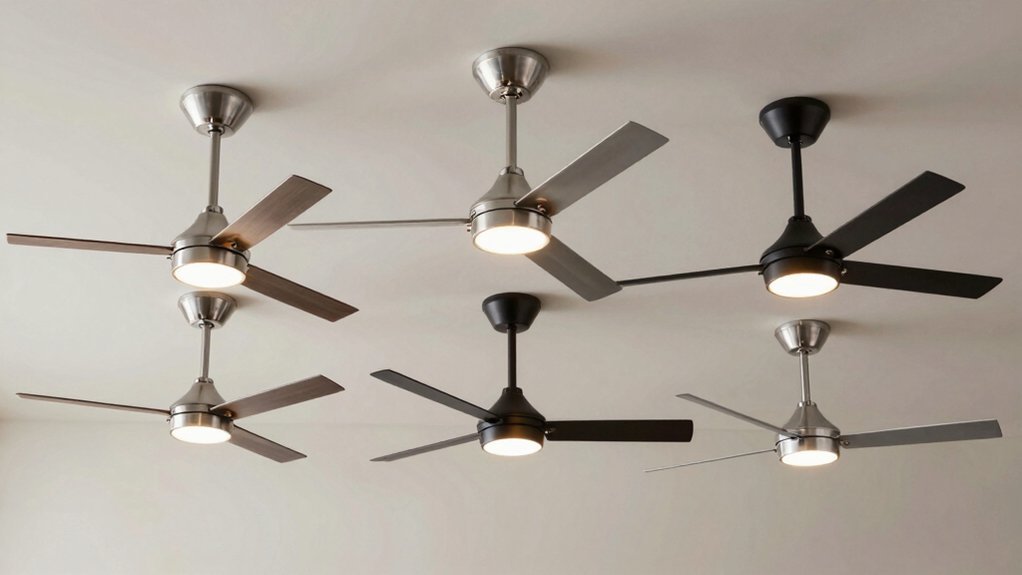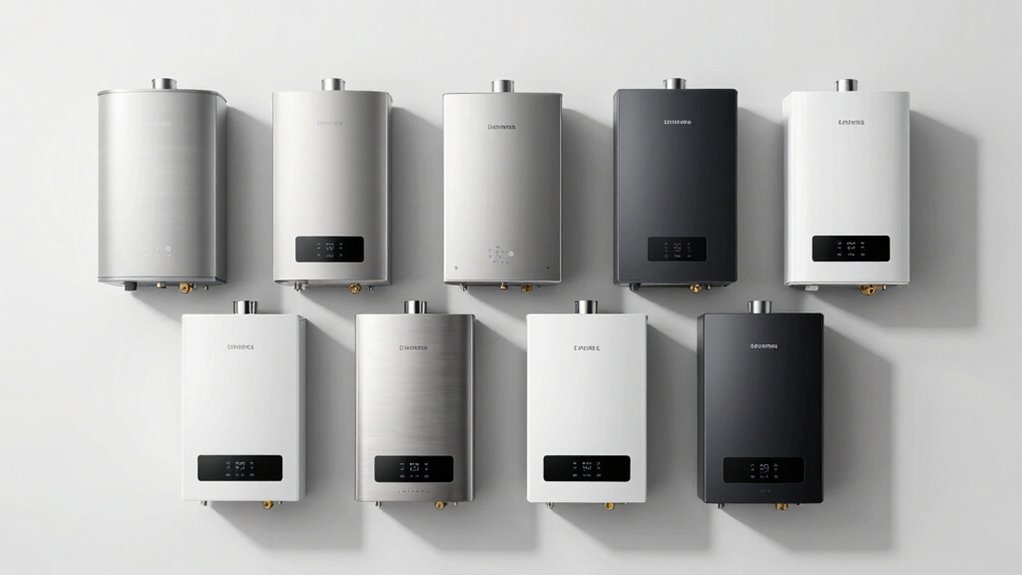Rainwater collection regulations vary widely across the U.S., so you'll need to check your specific state's laws. Some states allow unrestricted harvesting, while others have limits on collection amounts or require permits. Western states like Arizona and Texas are generally permissive, while Northeastern states may have stricter rules. Midwestern states are often lenient for personal use. Coastal and mountain regions might have additional restrictions due to environmental concerns. You're usually free to collect rainwater for non-potable uses like irrigation, but potable use may face more regulations. To guarantee compliance and learn about potential incentives, it's best to explore your state's specific guidelines.
Western States Regulations

Facing water scarcity challenges, many Western states have implemented regulations for rainwater collection. You'll find that these regulations vary considerably from state to state.
In Colorado, you're allowed to collect up to 110 gallons of rainwater using two barrels. Utah permits rainwater harvesting of up to 2,500 gallons, but you must register with the state. Arizona and Texas have the most permissive laws, allowing unrestricted rainwater collection.
California recently legalized rainwater harvesting, but you'll need to comply with local building codes. In Nevada, you can collect rainwater, but you might need a water right in some cases.
Oregon allows collection from roof surfaces only, while Washington permits it for non-potable uses without a water right.
If you're in New Mexico, you can harvest rainwater without restrictions. Idaho and Montana have no specific laws, but you should check local regulations.
Wyoming is the most restrictive, considering rainwater state property. Before setting up a collection system, it's essential to research your specific state and local laws to guarantee compliance and avoid potential fines.
Midwest Rainwater Collection Laws
Moving eastward from the Western states, you'll find that Midwest rainwater collection laws are generally more permissive. In most Midwestern states, you're free to collect rainwater for personal use without restrictions. However, it's important to check your specific state's regulations, as they can vary.
Illinois, for example, actively encourages rainwater harvesting. The state offers tax incentives for installing collection systems and has implemented a Green Infrastructure Grant Program to promote sustainable water practices.
In Ohio, you can collect rainwater without a permit, but there are guidelines for proper system installation and maintenance.
Michigan and Wisconsin have similarly lenient laws, allowing residents to harvest rainwater freely. Indiana permits rainwater collection but requires you to obtain a permit if you plan to use the water for drinking purposes.
Minnesota encourages rainwater harvesting as part of its water conservation efforts, even providing resources and guidelines for proper collection methods.
Some cities within Midwestern states may have additional ordinances or restrictions, so it's wise to check with your local government before installing a large-scale collection system.
Southern States Harvesting Guidelines

You'll find that rainwater harvesting regulations vary considerably across Southern states.
Each state has its own set of rules, ranging from permissive to restrictive, which govern collection methods and water usage.
Before setting up a rainwater harvesting system, you'll need to check your local laws for specific permitting requirements and any limitations on how you can use the collected water.
State-By-State Regulation Overview
In recent years, southern states have developed diverse approaches to rainwater harvesting regulations. You'll find that each state has its own unique set of rules and guidelines governing the collection and use of rainwater.
Some states, like Texas, actively encourage rainwater harvesting through tax incentives and building code requirements. Others, such as Arkansas, have minimal regulations but still allow the practice.
If you're in Florida, you'll need to follow specific guidelines for mosquito control when collecting rainwater. Georgia permits rainwater harvesting but requires proper system design and maintenance.
In Louisiana, you're free to collect rainwater without restrictions, while Mississippi has no specific laws addressing the practice.
North Carolina promotes rainwater harvesting through various programs and incentives, whereas South Carolina allows it with some limitations on usage.
Tennessee encourages rainwater collection but has specific regulations for larger systems. Virginia offers tax credits for rainwater harvesting equipment, and West Virginia allows the practice without major restrictions.
Before implementing a rainwater collection system, it's essential to check your local regulations, as they may differ from state-level guidelines. Always verify your system complies with health and safety standards.
Permitting and Usage Restrictions
When it comes to permitting and usage restrictions for rainwater harvesting in southern states, you'll find a range of requirements.
In Texas, you're generally allowed to collect rainwater without a permit, but some municipalities may have specific regulations.
Florida encourages rainwater harvesting and doesn't require permits for most residential systems. However, larger systems may need approval from local water management districts.
In Georgia, you'll need to follow the state's guidelines for rainwater harvesting, which include proper system design and maintenance.
South Carolina doesn't have statewide regulations, but local ordinances may apply.
Alabama allows rainwater collection but requires a permit for systems over 20,000 gallons.
Mississippi and Louisiana have few restrictions on rainwater harvesting, but you should check with local authorities for any specific requirements.
In Arkansas, you're free to collect rainwater, but the state recommends following best practices for system design and maintenance.
Remember that usage restrictions may vary. Some states allow rainwater for outdoor use only, while others permit indoor use with proper treatment.
Always check your local regulations and consider consulting a professional to guarantee your system complies with all relevant guidelines.
Northeast Water Catchment Rules
In the Northeast, you'll find a mix of states that fully embrace rainwater harvesting and those with specific restrictions.
You should check your local regulations, as some areas require permits or have limits on storage capacity.
Generally, you're allowed to use collected rainwater for non-potable purposes like irrigation, but guidelines may vary for indoor use or drinking water applications.
Legal States vs. Restrictions
Northeast states generally have favorable laws for rainwater harvesting, but you'll still find some variations in regulations.
In Maine, New Hampshire, Vermont, Massachusetts, Rhode Island, and Connecticut, you're allowed to collect rainwater without restrictions. These states encourage water conservation efforts and don't impose limits on the amount you can harvest.
New York and New Jersey also permit rainwater collection, but they've implemented some guidelines. In New York, you'll need to follow specific design and construction standards for your collection system.
New Jersey requires you to register your system if it's connected to the public water supply.
Pennsylvania allows rainwater harvesting but has stricter regulations. You'll need to obtain a permit for large-scale collection systems and adhere to specific water quality standards.
Delaware and Maryland have similar policies, encouraging rainwater collection while maintaining oversight on larger systems.
When planning your rainwater harvesting system in the Northeast, check your local municipal codes. Some cities might've additional requirements or restrictions beyond state regulations.
Storage and Usage Guidelines
Now that you understand the legal landscape for rainwater harvesting in the Northeast, let's explore the storage and usage guidelines you'll need to follow.
Most Northeastern states require you to store collected rainwater in closed, covered containers to prevent mosquito breeding and contamination. These containers should be food-grade quality and opaque to inhibit algae growth.
You'll typically need to label your rainwater storage system clearly, indicating it's non-potable water. Some states, like New Jersey, mandate regular system maintenance and annual inspections.
In Massachusetts, you must guarantee your collection system doesn't interfere with existing stormwater management infrastructure.
When it comes to usage, most Northeastern states restrict rainwater use to non-potable purposes such as irrigation, toilet flushing, and laundry.
If you're planning to use harvested rainwater for indoor purposes, you'll need to install a separate plumbing system to prevent cross-contamination with the municipal water supply.
In Vermont and New Hampshire, you may be required to obtain a permit if your system exceeds a certain capacity or if you're using the water for commercial purposes.
Arid States Collection Policies

Parched landscapes and water scarcity have shaped rainwater collection policies in arid states. You'll find that these regions often encourage rainwater harvesting to conserve precious water resources. However, regulations can vary considerably from state to state.
In Arizona, you're free to collect rainwater without restrictions. Colorado, on the other hand, only recently legalized rainwater harvesting for residential use. Utah allows collection up to 2,500 gallons, while Nevada has no specific laws but encourages the practice.
Here's a quick overview of rainwater collection policies in five arid states:
| State | Collection Allowed | Restrictions |
|---|---|---|
| Arizona | Yes | None |
| Colorado | Yes | Limited to residential use |
| Nevada | Yes | No specific laws |
| New Mexico | Yes | None |
| Utah | Yes | Up to 2,500 gallons |
When planning to harvest rainwater in these states, you'll want to check local regulations as well. Some cities or counties may have additional requirements or incentives for rainwater collection systems. Always verify your collection method complies with state and local laws to avoid potential fines or legal issues.
Coastal Regions Harvesting Restrictions
Coastal states face unique challenges when it comes to rainwater harvesting regulations. You'll find that these areas often have stricter rules due to concerns about saltwater intrusion and the potential impact on local ecosystems.
In many coastal regions, you're required to obtain permits before installing rainwater collection systems, especially for larger-scale operations.
You'll need to be aware of specific restrictions on collection methods and storage capacity. Some coastal areas limit the size of rainwater tanks or prohibit certain types of collection surfaces due to concerns about contaminants.
You may also encounter regulations regarding the use of collected rainwater, with some states restricting its use to non-potable purposes only.
It's essential to check your local regulations, as they can vary considerably even within coastal states. For example, in Florida, you're generally allowed to collect rainwater, but there are strict guidelines on system design and maintenance.
In California, you'll find that coastal counties often have additional requirements beyond state-level regulations.
Always consult your local water management district or environmental agency for the most up-to-date information on coastal rainwater harvesting restrictions in your area.
Mountain States Water Laws

Mountain states present a stark contrast to coastal regions when it comes to rainwater harvesting laws. These states often face water scarcity issues, leading to more complex regulations. You'll find that most mountain states encourage rainwater collection, but with specific restrictions and guidelines.
In Colorado, for example, you're allowed to collect up to 110 gallons of rainwater for outdoor use. Utah permits rainwater harvesting for both indoor and outdoor purposes, with a maximum storage capacity of 2,500 gallons. Idaho and Montana have relatively lenient laws, allowing unrestricted rainwater collection on private property.
When considering rainwater harvesting in mountain states, keep these points in mind:
- Water rights can impact your ability to collect rainwater
- Some states require permits for large-scale collection systems
- You may need to report your harvesting activities to local authorities
- Regulations can vary between urban and rural areas
- Collected water is often restricted to non-potable uses
It's essential to research your specific state and local laws before setting up a rainwater collection system.
As water conservation becomes increasingly important, these regulations may continue to evolve, so stay informed about any changes that could affect your harvesting practices.
Federal Rainwater Harvesting Oversight
Unlike state-level regulations, federal oversight of rainwater harvesting is relatively minimal. The federal government doesn't have specific laws regulating rainwater collection for personal use. However, you should be aware of a few federal considerations that may indirectly affect your rainwater harvesting practices.
The Clean Water Act doesn't explicitly address rainwater harvesting, but it does regulate pollutants in water bodies. If you're planning to use collected rainwater for purposes that might introduce contaminants into natural water systems, you'll need to comply with relevant Clean Water Act provisions.
The Safe Drinking Water Act comes into play if you're using harvested rainwater for drinking. While it doesn't directly regulate personal rainwater collection, it sets standards for public water systems. If you're considering using rainwater for potable purposes, you should follow these guidelines to guarantee safety.
The Environmental Protection Agency (EPA) encourages rainwater harvesting as a green practice but doesn't enforce specific regulations. They provide resources and guidelines for best practices in rainwater collection and use.
Frequently Asked Questions
Can Rainwater Collection Systems Affect Local Ecosystems?
Yes, your rainwater collection system can impact local ecosystems. You're diverting water that would naturally flow into streams, rivers, and groundwater. This can affect wildlife habitats, plant growth, and overall water availability in your area.
Are There Tax Incentives for Installing Rainwater Harvesting Systems?
You'll find that many states offer tax incentives for rainwater harvesting systems. Check with your local government or tax professional to see if you're eligible for credits, rebates, or deductions when installing these eco-friendly solutions.
How Does Rainwater Collection Impact Water Rights in Agricultural Areas?
You'll find that rainwater collection can affect water rights in agricultural areas. It may reduce downstream flow, impacting other users' access. You should check local laws and regulations before implementing a collection system on your farm.
What Are the Health Risks Associated With Drinking Collected Rainwater?
You'll face health risks when drinking collected rainwater due to potential contaminants. These include bacteria, parasites, and chemical pollutants. It's essential to properly filter and treat the water before consumption to avoid illness or long-term health issues.
Can Homeowners' Associations Restrict Rainwater Collection in Residential Areas?
Yes, homeowners' associations can restrict rainwater collection. They often have the authority to regulate property modifications and outdoor structures. Check your HOA's bylaws and covenants to see if there are any specific rules about rainwater harvesting.
In Summary
You've now got a good overview of rainwater collection regulations across different U.S. regions. Remember, these rules can vary considerably from state to state and even between local jurisdictions. It's essential you check your specific area's laws before setting up a rainwater harvesting system. By staying informed and compliant, you'll be able to make the most of this sustainable water source while avoiding potential legal issues.





Leave a Reply